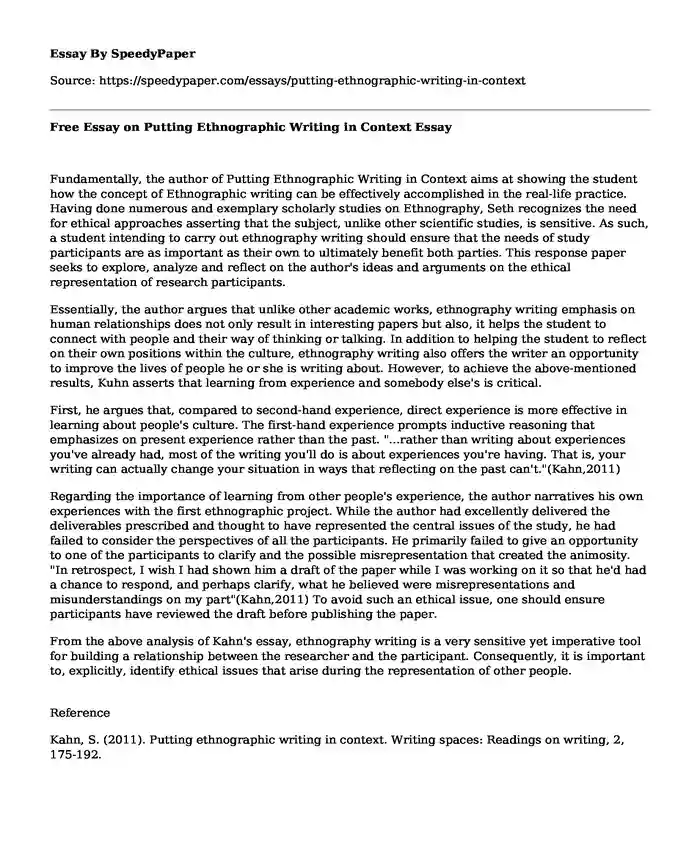Fundamentally, the author of Putting Ethnographic Writing in Context aims at showing the student how the concept of Ethnographic writing can be effectively accomplished in the real-life practice. Having done numerous and exemplary scholarly studies on Ethnography, Seth recognizes the need for ethical approaches asserting that the subject, unlike other scientific studies, is sensitive. As such, a student intending to carry out ethnography writing should ensure that the needs of study participants are as important as their own to ultimately benefit both parties. This response paper seeks to explore, analyze and reflect on the author's ideas and arguments on the ethical representation of research participants.
Essentially, the author argues that unlike other academic works, ethnography writing emphasis on human relationships does not only result in interesting papers but also, it helps the student to connect with people and their way of thinking or talking. In addition to helping the student to reflect on their own positions within the culture, ethnography writing also offers the writer an opportunity to improve the lives of people he or she is writing about. However, to achieve the above-mentioned results, Kuhn asserts that learning from experience and somebody else's is critical.
First, he argues that, compared to second-hand experience, direct experience is more effective in learning about people's culture. The first-hand experience prompts inductive reasoning that emphasizes on present experience rather than the past. "...rather than writing about experiences you've already had, most of the writing you'll do is about experiences you're having. That is, your writing can actually change your situation in ways that reflecting on the past can't."(Kahn,2011)
Regarding the importance of learning from other people's experience, the author narratives his own experiences with the first ethnographic project. While the author had excellently delivered the deliverables prescribed and thought to have represented the central issues of the study, he had failed to consider the perspectives of all the participants. He primarily failed to give an opportunity to one of the participants to clarify and the possible misrepresentation that created the animosity. "In retrospect, I wish I had shown him a draft of the paper while I was working on it so that he'd had a chance to respond, and perhaps clarify, what he believed were misrepresentations and misunderstandings on my part"(Kahn,2011) To avoid such an ethical issue, one should ensure participants have reviewed the draft before publishing the paper.
From the above analysis of Kahn's essay, ethnography writing is a very sensitive yet imperative tool for building a relationship between the researcher and the participant. Consequently, it is important to, explicitly, identify ethical issues that arise during the representation of other people.
Reference
Kahn, S. (2011). Putting ethnographic writing in context. Writing spaces: Readings on writing, 2, 175-192.
Cite this page
Free Essay on Putting Ethnographic Writing in Context. (2022, Nov 11). Retrieved from https://speedypaper.net/essays/putting-ethnographic-writing-in-context
Request Removal
If you are the original author of this essay and no longer wish to have it published on the SpeedyPaper website, please click below to request its removal:
- Music in My Life - Essay Example
- Personal Statement Example
- Free Essay Sample on Institutional Cruelty
- Career Goals Essay Sample: Accounting Job Interviews
- Free Essay on the Health Status of African American Minority Group
- Free Essay Sample: Customer Relationship Management at Amazon
- Healthcare Benefits of Moringa Tree Free Essay Example
Popular categories





